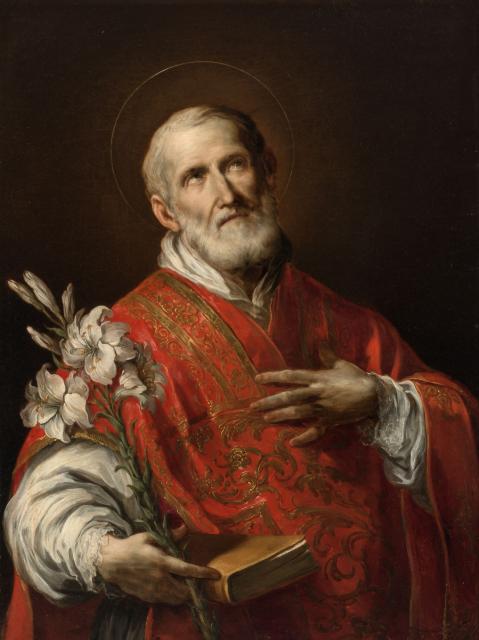Posted on May 26, 2019 View all news
Laudetur Jesus Christus! Gelobt sei Jesus Christus!
Sia lodato Gesù Cristo! Praised be Jesus Christ!
Today we celebrate the Feast of the Founder of the Congregation of the Oratory, St. Philip Neri. Happy Feast Day to all!
Please find this biography of St. Philip Neri below. He is too unknown in the world, as he would prefer it, but let us spread word about it. Have a blessed week ahead!

“Born at Florence, Italy, 22 July, 1515; died 27 May, 1595. Philip’s family originally came from Castelfranco but had lived for many generations in Florence, where not a few of its members had practiced the learned professions, and therefore took rank with the Tuscan nobility. Among these was Philip’s own father, Francesco Neri, who eked out an insufficient private fortune with what he earned as a notary. A circumstance which had no small influence on the life of the saint was Francesco’s friendship with the Dominicans; for it was from the friars of S. Marco, amid the memories of Savonarola, that Philip received many of his early religious impressions. Besides a younger brother, who died in early childhood, Philip had two younger sisters, Caterina and Elisabetta. It was with them that “the good Pippo”, as he soon began to be called, committed his only known fault. He gave a slight push to Caterina, because she kept interrupting him and Elisabetta, while they were reciting psalms together, a practice of which, as a boy, he was remarkably fond. One incident of his childhood is dear to his early biographers as the first visible intervention of Providence on his behalf, and perhaps dearer still to his modern disciples, because it reveals the human characteristics of a boy amid the supernatural graces of a saint. When about eight years old he was left alone in a courtyard to amuse himself; seeing a donkey laden with fruit, he jumped on its back; the beast bolted, and both tumbled into a deep cellar. His parents hastened to the spot and extricated the child, not dead, as they feared, but entirely uninjured.
In 1551, he received a true vocation from God. At the bidding of his confessor — nothing short of this would overcome his humility — he entered the priesthood, and went to live at S. Girolamo, where a staff of chaplains was supported by the Confraternity of Charity. Each priest had two rooms assigned to him, in which he lived, slept, and ate, under no rule save that of living in charity with his brethren.
Philip devoted his afternoons to men and boys, inviting them to informal meetings in his room, taking them to visit churches, interesting himself in their amusements, hallowing with his sweet influence every department of their lives. At one time he had a longing desire to follow the example of St. Francis Xavier, and go to India. With this end in view, he hastened the ordination of some of his companions. But in 1557 he sought the counsel of a Cistercian at Tre Fontane; and as on a former occasion he had been told to make Rome his desert, so now the monk communicated to him a revelation he had had from St. John the Evangelist, that Rome was to be his India. Philip at once abandoned the idea of going abroad, and in the following year the informal meetings in his room developed into regular spiritual exercises in an oratory, which he built over the church.
In 1559, Philip began to organize regular visits to the Seven Churches, in company with crowds of men, priests and religious, and laymen of every rank and condition. These visits were the occasion of a short but sharp persecution on the part of a certain malicious faction, who denounced him as “a setter-up of new sects”. The cardinal vicar himself summoned him, and without listening to his defence, rebuked him in the harshest terms. For a fortnight the saint was suspended from hearing confessions; but at the end of that time he made his defence, and cleared himself before the ecclesiastical authorities. In 1562, the Florentines in Rome begged him to accept the office of rector of their church, S. Giovanni dei Fiorentini, but he was reluctant to leave S. Girolamo. At length the matter was brought before Pius IV, and a compromise was arrived at (1564). While remaining himself at S. Girolamo, Philip became rector of S. Giovanni, and sent five priests, one of whom was Baronius, to represent him there. They lived in community under Philip as their superior, taking their meals together, and regularly attending the exercises at S. Girolamo. In 1574, however, the exercises began to be held in an oratory at S. Giovanni. Meanwhile the community was increasing in size, and in 1575 it was formally recognised by Gregory XIII as the Congregation of the Oratory, and given the church of S. Maria in Vallicella. The fathers came to live there in 1577, in which year they opened the Chiesa Nuova, built on the site of the old S. Maria, and transferred the exercises to a new oratory. Philip himself remained at S. Girolamo till 1583, and it was only in obedience to Gregory XIII that he then left his old home and came to live at the Vallicella.”
Read more: http://www.newadvent.org/cathen/12018b.htm
